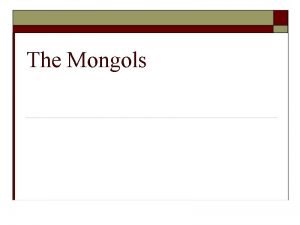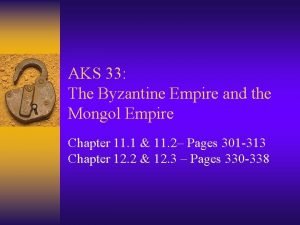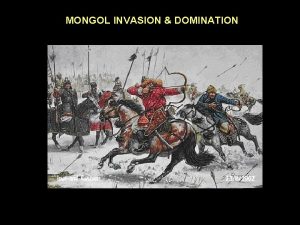Impact of Mongol Invasions Impact of Mongol Invasion





- Slides: 5

Impact of Mongol Invasions

Impact of Mongol Invasion on Russia • While Mongols controlled Russian territory many of the local rulers were kept but they had limited power to rule. • Peasants paid heavy taxes which were collected by Russian bureaucrats who took their cut, paid the Mongol leaders and gave little to no services to the Russian people for their money • Russia became a vassal state (similar to the relationship between the King and the lower levels of the feudal pyramid) facilitating the expansion of serfdom and a lack of Russian political unity • Lacking unity and cultural development, Russia remained stagnant at the same time Europe was growing culturally. Russia will continue to lag behind Europe and many cultural and technological ways for centuries to come.

Impact of Mongol Invasion on Europe • With The Mongols in control of China, the SILK ROAD was protected and able to operate, running goods from China into Europe • Trade made both the Mongols very rich as well as the Europeans. The relationship was mutually beneficial and Europeans were becoming addicted to having items from china available (silk, porcelain, gunpowder, tea, etc. ) • Mongol conquests likely brought the bubonic plague to Europe • Silk road trade introduced guns for the first time in Europe • Mongol policies of occasionally murdering entire villages lead to wide spread panic in Europe

Impact of Mongol Invasion on Middle East & India • 1258 Abbasid Caliphate was defeated and the political unity of the Caliphates ended as the Mongols took control • Local bureaucrats (governmental workers) were employed and local rulers were permitted to rule as long as order was maintained and taxes were collected. • Many Mongols converted to Islam by 1295 and often Mongol culture mixed with local cultures • Muslim Northern India held off the initial Mongol invasions, but was later invaded in 1398 by the Mongols and many Muslims were killed • Muslims in the middle east were sitting directly between China and Europe. The increased traffic on the silk road made some very rich.

Impact of Mongol Invasion on China • 1215 the Mongols took Beijing. In 1279, they overthrew the Song Dynasty making it the first time China was ruled by a foreign power • Civil service exams were ended, the bureaucracy (governmental officials) was staffed with foreigners and not Chinese • Chinese were subject to different laws and were separated from the Mongols which allowed Chinese to maintain a separate cultural identity from the Mongols • Beijing was connected to Vienna, Italy via horse relay stations which connected China to the rest of the European World • Though Mongols were not directly involved in trade, merchants and foreigners were welcomed into court and overland maritime trade flourished. • Trade made both the Mongols very rich as well as the Europeans. The relationship was mutually beneficial and Europeans were becoming addicted to having items from china (silk, porcelain, gunpowder, tea, etc. )







